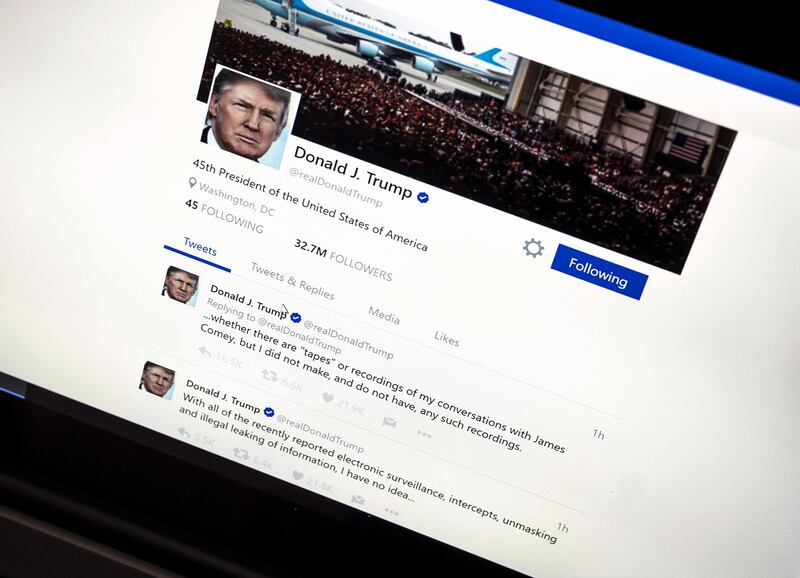Barack Obama may have been the first US president to use Twitter, but the social media platform has played a far more central role in the presidency of Donald Trump — the latter using Twitter to bypass journalists and his own communications staff to share his views directly with the American public.
Despite promising after the election in November last year to be “very restrained [on Twitter], if I use it at all”, Mr Trump has continued to tweet on a daily basis — sometimes posting as many as 11 thoughts a day across a timeline that can span 3am until midnight.
This is perhaps unsurprising given that Mr Trump's affinity for the medium began long before he became president. Since joining Twitter in March 2009, Mr Trump has tweeted from his personal @realDonaldTrump account more than 36,000 times.
And although Mr Trump was handed the reins to the official @POTUS Twitter account after Mr Obama left office in January, he has preferred to continue to tweet from his personal account, which he, rather than his staff, controls.
_________________
Read more:
[ Trump's Twitter account deactivated by employee leaving company ]
[ Macron and Trump: improbable social media soul-mates ]
[ One year after Trump victory, both country and president face huge challenges ]
_________________
Dr Darren Lilleker, a political communications professor at the UK's Bournemouth University, said Mr Trump's continued use of his personal Twitter account indicated there was "no separation between the business tycoon, Apprentice host, candidate and president".
"With Trump there is no change in personae or style" no matter the role he is taking on at any one time, Dr Lilleker told The National.
He said Mr Trump's use of Twitter lent his presidency a "certain authenticity".
"He uses Twitter to share his thoughts and opinions with the world and one does not have to speculate what the president is thinking about global or domestic events — he tweets immediately," Dr Lilleker told The National.
The president himself tweeted on July 2 that his use of social media was not "presidential" but "modern day presidential".
Before last year's presidential election on November 8, Mr Trump's account had an estimated 13 million followers. By inauguration day on January 20, this number had increased to 21 million; today it has grown to 42 million, with global PR firm Burson-Marsteller declaring last month that Mr Trump had overtaken Pope Francis to become the most followed world leader on Twitter. The @POTUS account, meanwhile, has just 21 million followers.
Not only does Mr Trump have more reach with his personal account, but he is also able to delete tweets there — a plus for a president known for his controversial and off-the-cuff remarks. The @POTUS account, however, is considered to be an official communications channel and all tweets must be left to the National Archives and Mr Trump's presidential library.
But being able to delete tweets has not been enough to save Mr Trump from controversy, however, and he has been widely criticised for tweeting before thinking.
In September, North Korea's foreign minister, Ri Yong-ho, said remarks Mr Trump made on Twitter — where he said Mr Ri "won't be around much longer" if he continued to echo the thoughts of North Korean leader Kim Jong-un — constituted a declaration of war.
_________________
Read more:
[ New York attacker should get the death penalty, Trump says ]
[ Trump hits back at republican critics in senate ]
_________________
On Monday last week, Mr Trump's former presidential rival, Hillary Clinton, said the president's use of Twitter represented a “clear and present danger to world security”.
“Trump does not exercise diplomacy, so his seemingly unthought through communication can be damaging to the reputation of the USA," Dr Lilleker said. "The scope for negotiations between nations is limited if the president is communicating publicly about the issue under discussion."
Mr Trump, who in 2012 described Twitter as "like owning your own newspaper — without the losses", has defended his prolific use of the platform, going so far as to say he “may not have won the US election without it”.
But although Mr Trump is an avid tweeter, he does not appear to be as interested in reading the tweets of others, with @realDonldTrump only following 45 other accounts.
“It hints he is not interested in listening to many people, and, given [most of] his followers are either his businesses, his family, supportive journalists and Republicans, he is purely monitoring a narrow inner circle of individuals,” Dr Lilleker said.
“Perhaps he seeks reinforcement from these people, he wants to see them visibly agreeing with him and avoids and dismisses differences of opinion.
"But fundamentally he is a broadcaster on Twitter; it is about him."
Polls have consistently shown that the majority of Americans would like their president to "broadcast" his views on Twitter less, however, or completely abandon the platform altogether. According to the findings of a Politico-Morning Consult poll released in June, 69 per cent of voters believe Mr Trump “uses Twitter too much", while only 23 per cent say his use of the site is a good thing and 51 per cent believe it hurts national security.
Meanwhile, the findings of a Quinnipiac University poll released in September showed that 70 per cent of voters want the president to stop tweeting from his personal account.
But one user who would be against Mr Trump leaving Twitter is the site’s co-founder and CEO Jack Dorsey for whom the president's personal account is the gift that keeps on giving.
“I feel very proud of the role of the service and what it stands for,” Mr Dorsey said last December following Mr Trump's election victory. “It’s had such a spotlight on it through his (Mr Trump's) usage and through the election."






